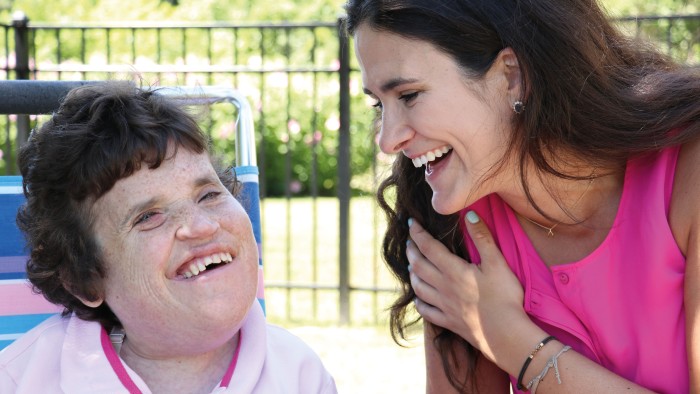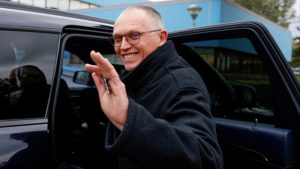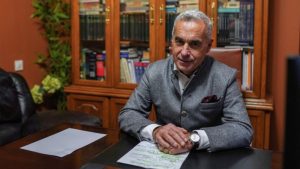How a cousin’s disability inspired a drive for inclusive housing

Micaela Connery was just three months old when her cousin, Kelsey Flynn O’Connor, was born with multiple and severe disabilities. Growing up together, Connery “understood the world through a lens of disability”, witnessing up close the importance of inclusion, access and rights.
That theme became a “through line” in Connery’s life. At the age of 15, she launched Unified Theater, a schools-based performing arts programme that brings together people with and without disabilities.
Later, continuing her commitment, Connery went on to study for a masters in public policy at the John F Kennedy School of Government at Harvard University, followed by an MBA at University College Dublin’s Michael Smurfit Graduate School of Business.
During her postgraduate studies she developed the idea and business plan for The Kelsey. Co-founded with her cousin and named in her honour, this non-profit organisation builds and advocates for disability-inclusive and affordable housing, and is now led by Connery in San Francisco.
European Business Schools Ranking 2024

Read the ranking and report
It was an “unfortunate realisation” that led to The Kelsey. Connery ran the Unified Theater full-time after high school and college. Part of the thinking was that supporting young people with or without disabilities to access inclusive experiences at school would help them “in the journey towards a fully included adulthood”, she says.
But she came to the conclusion that “inclusive adulthood didn’t exist”. Students and their families would talk about “a cliff”, with options for inclusive living and accessible environments dropping off when they left school. Meanwhile, Kelsey was struggling to move from living with her parents to independent living in the community.
Seeing Kelsey’s challenges set Connery on the path to researching housing for adults with disabilities and inclusive community living. In 2014, she began her masters at Harvard, focusing on housing, disability, social entrepreneurship and social policy, which helped her come up with the idea of The Kelsey.

But, in her second year, Connery realised she wanted to explore the financial and business angle of the idea. The Kelsey has a “dual mission”, she says — financing, developing and running disability inclusive, affordable housing developments with partners, and then connecting that to broader policy, social and systems change. It also helps others build inclusive homes through technical assistance, resources and partnerships.
Connery wanted time to develop a business plan. So, in 2016, she went from Harvard to the MBA in Ireland, funded by the Mitchell Scholarship, which is run by the US-Ireland Alliance. Connery tailored her course — she knew she would go ahead with The Kelsey, if not the precise form. “What was really cool is that, in my year . . . at Smurfit, all of my professors supported me to apply projects and do coursework that was related to [The Kelsey],” she says.
For example, in her marketing class, she looked at how to advertise one of these communities, and she used the finance class to build a business and finance model. Towards the end of the MBA, during her capstone project, Connery wrote her final business plan.
Even lessons that did not at first seem helpful have since proved important. Smurfit MBA students come from around the world and many go on to work in multinational companies, Connery says, so they have a lot of coursework on managing global, diverse teams across different countries.
At the time, she did not think it was applicable to her. But, then, the Covid-19 pandemic hit, and The Kelsey switched entirely to remote working. The organisation is now hybrid, with employees spread across the US. That enables the organisation to be inclusive in its hiring, with more than 60 per cent of the team being people with disabilities, she says.
“That coursework around managing teams across different contexts, different geographies and different experiences is definitely even more relevant than I ever imagined it would be,” Connery says.
CV
2002-2014 Founder and executive director, Unified Theater
2014-2016 Masters in Public Policy, John F Kennedy School of Government, Harvard University
2015 Research fellow, Joint Center for Housing Studies at Harvard University
2016-2017 MBA, University College Dublin’s Michael Smurfit Graduate School of Business
2018-present Co-founder and chief executive of The Kelsey
The first community built by the organisation, the Kelsey Ayer Station, based in San José, California, started construction in 2022 and is now fully operational, with 115 apartments for people with or without disabilities, from all incomes and backgrounds. The Kelsey Civic Center, in San Francisco, broke ground in 2023 and is due to open early next year, with 112 homes. A third community in Alabama is in the works, alongside other projects.
Residents pay rents based on their income, from a few hundred dollars a month to a couple of thousand. Other services include the “inclusion concierge” — a person on hand to help link residents to any services they need.
That extra help “looks different for everybody”, says Connery. It might be social help to connect with the community or crisis management, co-ordinating services and helping to respond to any challenges, she adds.
The parent company is funded through philanthropy and earned revenue, which includes payments from technical assistance and fees from developments. Each community is a separate entity, built with “a mix of public, private and philanthropic dollars” and becomes “self-sustaining” through rents and operating expenses.
Kelsey died in 2018 at the age of 31. And, today, Connery is particularly proud of how the organisation that bears her cousin’s name reflects “the whole of who she was”, and recognises the individuality and complexity of the lives and needs of people with disabilities.
“It was really intentional for The Kelsey as an organisation — and her legacy — to be across disability and really think about people with disabilities in their entirety and in their diverse access needs and evolving life experiences,” she says.
The other thing her cousin would want is “more”, Connery says. Kelsey communicated using signs and one of her favourites was to clap, signalling more.
“The transformative impact of this kind of disability-forward housing has now been realised and we need to now bring that to other people,” Connery says. “I think she would join everybody else in saying there’s got to be more communities like this . . . This can’t just be one and done.”
#cousins #disability #inspired #drive #inclusive #housing







